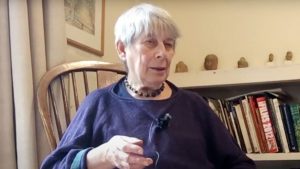Acclaimed child psychotherapist on six decades advocating for infant mental health

Juliet has had a significant impact on child psychotherapy. As the niece of John Bowlby, she robustly defends his place in the field of psychoanalysis, shares her concept of ‘Too Good Mothering’ and how she has integrated attachment theory and research on intergenerational trauma. She recalls how Enid Balint lifted her from depression and how penis envy was a completely normal part of conversation growing up!
Juliet was a Child and Adolescent Psychotherapist at the Tavistock Clinic and the London Child Guidance Training Centre from 1960-2000 and has had a significant impact on child psychotherapy. As the niece of John Bowlby, it is perhaps no surprise that she has been a keen advocate of attachment theory, but she has been credited with doing much in her own right to develop child psychoanalytic theory by integrating attachment theory and research on intergenerational trauma and its impact on infant mental health.
Interview by Jane O’Rourke
Her colleague Dilys Daws says, ‘Juliet has widened our view of what child psychotherapy can encompass and shows that diametrically differing approaches can co-exist and nourish each other’.
Another colleague, Ann Horne, says ‘Juliet has for over 50 years quietly questioned theory, subjected it to scrutiny and declared where it is found wanting, in the manner of her main influences John Bowlby and DW Winnicott. An advocate of the importance of environment and family, she challenged practice that focussed exclusively on the internal world of the child and importantly championed her uncle John Bowlby’s work on attachment…
Ann Horne continues to say about Juliet ‘Always aware of the power of psychoanalytic insights, she has used these to inform change in the care and understanding of children, from medical students in Hong Kong in the late 60’s to establishing the original course in Infant Mental Health at the Tavistock and founding with colleagues the UK branch of Association of Infant Mental Health. That she communicates with intelligence, elegance and clarity has been vital in all of this. More people should read and listen to her: I am so glad that MindinMind has enabled it’.
Juliet attended Newnham College and studied biology and psychology at Cambridge University. After working in the Yale Child Study Centre in the US she began child psychotherapy training at the Tavistock Clinic in 1960. Enid Balint was her training analyst and was supervised by Donald W. Winnicott.
Juliet also undertook family therapy training as well as training in child and adult psychoanalytic psychotherapy. She was a founder member of the independent child psychotherapy training run by the British Association of Psychotherapists. She has retired from private practice as a psychotherapist for adults and children but remains an Honoured Member of the Association of Child Psychotherapists.
For more interviews from leading practitioners in child mental health visit our interviews page.
If you would like to help transcribe this interview, please contact us using the feedback form at the bottom of this page.
Hopkins, J., 1977. Living under the threat of death: The impact of a congenital Illness on an eight-year-old boy. Journal of Child Psychotherapy, 4(3), pp.5–21.
Hopkins, J., 1984. The probable role of trauma in a case of foot and shoe fetishism: Aspects of the psychotherapy of a 6-year-old girl. International review of psycho-analysis, 11, pp.79–90.
Hopkins, J., 1986. Solving the mystery of monsters: steps towards the recovery from trauma. Journal of Child Psychotherapy, 12(1), pp.61–71.
Hopkins, J., 1989. Ways of seeing: 4. Journal of Child Psychotherapy, 15(2), pp.33–39.
Hopkins, J., 1990. The observed infant of attachment theory. British Journal of Psychotherapy, 6(4), pp.460–470.
Hopkins, J., 1991. Failure of the holding relationship. Attachment across the life cycle, pp.187–198.
Hopkins, J., 1992. Infant-parent psychotherapy. Journal of Child Psychotherapy, 18(1), pp.5–17.
Hopkins, J., 1994. Therapeutic interventions in infancy: Two contrasting cases of persistent crying. Psychoanalytic Psychotherapy, 8(2), pp.141–152.
Hopkins, J., 1996. The dangers and deprivations of too-good mothering. Journal of Child Psychotherapy, 22(3), pp.407–422.
Hopkins, J., 1999a. Narcissistic illusions in late adolescence: The role of defensive and gratifying object‐relationships and generative opportunities. Psychoanalytic Inquiry, 19(2), pp.229–242.
Hopkins, J., 1999b. The child and adolescent psychotherapist and the family: The family context.
Hopkins, J., 2000. Overcoming a child’s resistance to late adoption: How one new attachment can facilitate another. Journal of Child Psychotherapy, 26(3), pp.335–347.
Hopkins, J., 2003. A Case of Foot and Shoe Fetishism in a 6-Year-Old Girl. Trevor Lubbe (red.), The Borderline Psychiatric Child: A Selective Integration,(London: Routledge, 2000), pp.109–29.
Hopkins, J., 2012. Fifty years ago: John Bowlby recommends the use of a single case study to understand a child’s detached relationships. Attachment-New Directions in Psychotherapy and Relational Psychoanalysis Journal, 6(3), p.173.
Hopkins, J. and Phillips, G., 2009. Some contributions of attachment theory and research. The Handbook of Child and Adolescent Psychotherapy: Psychoanalytic Approaches, 2, pp.38–50.
Thomson-Salo, F., 2014. Infant Observation: Creating Transformative Relationships. London: Karnac Books.